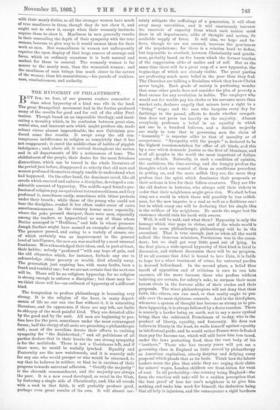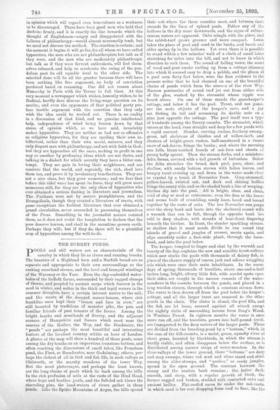THE HYPOCRISY OF PHILANTHROPY.
BUT few, we fear, of our present readers remember a time when hypocrisy of a kind was rife in the land. The great Evangelical movement had in the forties produced
many of the results for good and for evil of the older Puri- tanism. Though based on an impossible theology, and incul- cating a morality which, in its confusion between great sins, venial sine, and innocent acts which might produce sin, made robust virtue almost impracticable, the new Calvinism pro- duced some fine results. It swept away the old con- temptuous indifference to religion so completely that it has not reappeared ; it cured the middle-class of habits of piggish
indulgence ; and, above all, it revived throughout the nation and in all departments of life a seriousness of tone. The childishness of the people, their desire for the most frivolous distractions, which can be traced in the whole literature of the period just before, disappeared so utterly that old men and women professed themselves simply unable to understand what had happened. On the other hand, the dominant creed, like all creeds which succeed and enforce a discipline, developed a con- siderable amount of hypocrisy. The middle-aged found a pro- feseion of religion pay, as equivalent to trustworthiness, and they professed it, sometimes easily, sometimes with bitter protests under their breath ; while those of the young who could not bear the discipline, evaded it too often under cover of extra sanctimoniousness. In the country towns more especially, where the yoke pressed sharpest, there were men, especially among the traders, as hypocritical as any of those whom Butler scourged in " Hudibras," and lads in whose presence Joseph Surface might have seemed an exemplar of sincerity. The pressure passed, and owing to a variety of causes, one of which certainly was an improvement in the general level of intelligence, the new era was marked by a most unusual frankness. Men acknowledged their ideas, and, in part at least, their habits; nobody "professed "'with any hope of gain, and the old etiquettes which, for instance, forbade any one to acknowledge either poverty or wealth, died silently away. The generatioh just expiring has, with many faults, been a frank and truthful one; but we are not certain that the next one will be. There will be no religious hypocrisy, for no religion is strong enough to enforce a discipline ; but there may be— we think there will be—an outburst of hypocrisy of a different kind.
The temptation to profess philanthropy is becoming very strong. It is the religion of the hour, in many depart- ments of life no one can rise fast without it, it is saturating literature, and its opponents, if there are any left, are liable to obloquy of the most painful kind. They are detested alike by the good and by the mob. All men are beginning to pro- fess love for the poor, sometimes under the most extravagant forms; half the clergy of all sects are preaching a philanthropic cult ; most of the novelists devote their efforts to exciting sympathy for " the disinherited ; " and all politicians of all parties declare that in their hearts the one strong sympathy is for the multitude. There is not a Coriolanus left, and if there were, he would be socially lynched. Equality and Fraternity are the new watchwords, and it is scarcely safe for any one who would prosper or who would be esteemed, to say that he believes in neither, or that he is careless of their progress towards universal adhesion. " Gratify the majority" is the eleventh commandment, and the majority are always the poor. It is a new creed developed, as usual in the West, by fostering a single side of Christianity, and, like all creeds with a root in that faith, it will probably produce good, perhaps even great results of its own. It will almost cer-
tainly mitigate the sufferings of a generation, it will clean away many unrealities, and it will enormously increase
the reservoir of capacity from which each nation must
draw in all departments, alike of thought and action, its available supply of force. It will also, we hope and be- lieve, though we are not assured, increase the gentleness of the populations ; for there is a relation hard to define, but impossible to overlook, between Christianity and gentle- ness, probably based on the lesson which the former teaches of the suppression alike of malice and of self. But at the same time there will be a great crop of a new hypocrisy, the beginnings of which are already visible. The great parties are professing much more belief in the poor than they feel. The Churches are talking a Socialism which they know Christ never taught. Each grade of society is professing wonder
that some other grade does not consider the plea of poverty a final excuse for any revolution in habits. The employer who
would not for worlds pay his clerks or his servants more than market rate, declares angrily that miners have a right to a "living" wage ; and the man who bargains every day for farthings in the pound, affects to doubt whether competi- tion does not press too heavily on the majority. Almost everybody professes a belief in an equality in which
not one in a hundred believes, and a distinct majority are ready to vote that in governing men the claim of ‘. humanity " is superior alike to that of morality or of competence. "Sympathy with the people" is declared to be the highest recommendation for office of all kinds, and this by a race which demands justice as the first of blessings, and is of all peoples in the world the most impatient of failure among officials. Naturally, in such a condition of opinion, the ambitious, the time-serving, and the hungry profess the thoughts which are wanted of them as conditions precedent to getting on, and the more selfish they are, the more they profess that the spirit which dominates their proposals or their actions is love for their fellow-creatures. They are like the old dealers in lotteries, who always sold their tickets in order that their neighbours might grow rich. We shall before long see a world in which there will possibly be less selfish- ness, for the new impulse is a real as well as a fictitious ones but in which every one will be declaring that his single idea is the welfare of his neighbour. He sands the sugar lest his customer should ruin his teeth with sweets.
Well, it will be said, and what then P Hypocrisy is only the homage which vice pays to virtue, and if the whole worldis forced to seem philanthropic, philanthropy will be in the ascendant. That is true enough, just as when all the world talked like Genevan ministers, Puritanism was in the ascen- dant; but we shall get very little good out of lying. In the first place, a wide-spread hypocrisy of that kind is fatal to discussion, and without discussion there will be no progress. If we all assume that Abel is bound to love Cain, it is futile to hope for a wiser treatment of crime, for universal pardon is decreed beforehand. In the second place, a belief thus bereft of opposition and of criticism is sure to run into excesses, all the more because those who profess without believing are certain, for safety's sake, to surpass their more honest rivals in the fervour alike of their credos and their proposals. The wiser philanthropists will not deny that their faith, like others, can run mad, or that sanity ought to pre- side over the most righteous counsels. And in the third place, whenever a system of thought has become so strong as to pro- duce hypocrisy, it is always followed by a fierce reaction. There is scarcely a harder being on earth, not to say a more cynical being, than the cultivated Frenchman of to-day, who is the product of liberty, equality, and fraternity. He does not believe in liberty in the least, he walls himself against equality in intellectual pride, and he would rather France were defeated than pay the Income-tax, which will still leave him less taxed, under the laws protecting food, than the vast body of his " brothers." Those who live twenty years will yet see a governing class in England as little moved by philanthropy as American capitalists, utterly denying and defying every proposal which pleads that as its basis. Think how the labour leaders scorn the plea that while they are urging their claim for miners' wages, London children are frost-bitten for want of coal. In all probability—the country being England—the form the reaction will take will be a sudden perception that the best proof of love for one's neighbour is to give him
nothing and make him work for himself, the deduction being that all help is injurious, and the consequence a rigid hardness in opinion which will regard even benevolence as a weakness to be discouraged. There have been good men who held that doctrine firmly, and it is exactly the line towards which the thought of Englishmen—angry and disappointed with the failures of philanthropy—would almost necessarily tend; but we need not discuss the method. The reaction is certain ; and the moment it begins it will go far, for all whom we have called hypocrites, the men who are not philanthropists but talk as if they were, and the men who are moderately philanthropic but talk as if they were fervent enthusiasts, will feel them- selves released, and help to accelerate the swing of the pen- dulum past its old equable level to the other side. The mischief done will be all the greater because there will have been nothing like free argument, no body of conviction produced based on reasoning. One did not reason about Monarchy in Paris with the Terror in full blast. At this very moment a newspaper which wishes, honestly wishes, to be Radical, hardly dare discuss the living-wage question on its merits ; and even the opponents of that political party pre- face hostile argument with the assertion that they only wish the idea could be worked out. There is no reality in a discussion of that kind, and no genuine intellectual help, independence of mind being beaten down by that stress of opinion which, as we have said, invariably makes hypocrites. They are neither so bad nor so offensive as religious hypocrites, for they are spoiling their own in- tellectual, rather than their own moral, natures, and they only disgust men with philanthropy, and not with faith in God ; but they are hypocrites all the same, seeking to profit in one way or another by professing ideas which are not theirs, and talking in a dialect for which secretly they have a bitter con- tempt. They see gain in loving their neighbours, and are resolute that the world, and especially the rich, shall love them too, and prove it by involuntary benefactions. They are not a nice class, but they grow numerous ; and we fear that before this tidal wave has spent its force, they will grow more numerous still, for they are the only class of hypocrites who ever obtained a serious footing in literature and journalism. The Puritans were not by nature pamphleteers, and the Evangelicals, though they created a literature of tracts, with some exceptions the feeblest literature that ever obtained a grand circulation, never succeeded in possessing themselves of the Press. Something in the journalist nature resisted them, as it does not resist the temptation to declare that the poor deserve heaven, and shall in the meantime govern earth. Perhaps they will; but if they do, there will be a plentiful crop of hypocrites among the well-to-do.







































 Previous page
Previous page